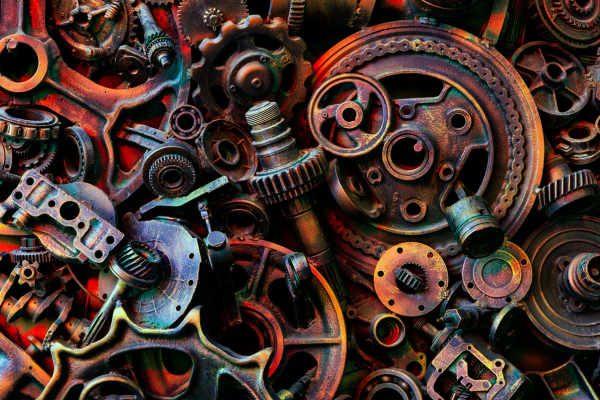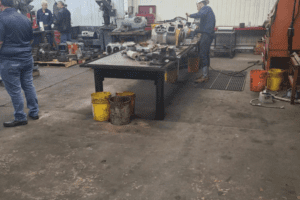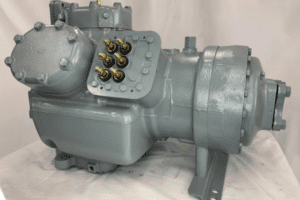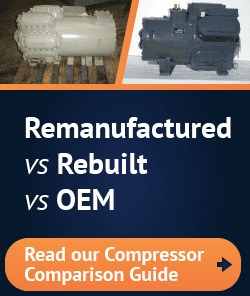When you’re in the market for commercial compressors, you shouldn’t settle for anything less than the best.
The difficulty and cost of working directly with OEM-affiliated compressor wholesalers have caused companies in many industries to look beyond the basics. This has enabled enterprises to discover the savings, speed, and convenience of remanufactured commercial compressors.
With a remanufactured compressor, you can get performance comparable to an all-new unit both faster and at an attractive price. All major compressor brands are available and it is not unusual to achieve savings of 20%, 30%, or more over standard prices. Plus, you can get your newly remanufactured unit within weeks rather than months.
The benefits of compressor remanufacturing are compounded for enterprises that must use dozens or even hundreds of compressors to maintain their operations. Dairy farms, meatpacking plants, grocery stores, and a range of others – especially in the agricultural sector – have saved millions of dollars over time.
And all this without compromising on the precise brand and model of compressor they wish to use.
The problem: It is easy to be misled about the services you’re receiving in any secondary market.
In particular, you should always be alert to the difference between remanufactured and rebuilt.
Remanufactured Versus Rebuilt Compressor Parts: Completely Different Results for Your Business
While “rebuilt” and “remanufactured” might sound similar, they are anything but.
Remanufacturing refers to a specific, detailed process that requires genuine expertise in refrigeration system engineering. During that process, some major component of a refrigeration or cooling system – typically the compressor – is completely disassembled, cleaned, and inspected.
This inspection takes into account all of that model’s potential points of fault and its whole history of operation to date. This ensures that no matter which internal parts need to be swapped out, they are found and dealt with appropriately. The inspection alone can encompass dozens of individual points.
Once the inspection is complete and all necessary replacements are made, the job isn’t done.
The entire compressor needs to be cleaned inside and out. When reassembly is complete, it usually receives a battery of tests to verify that everything works as intended. Compressor output is benchmarked and compared to an all-new unit.
The end result: A rejuvenated compressor ready to exceed your expectations for about seven to ten years, as you would expect from your favorite compressor brand. The best compressor remanufacturers will work with you over the years so you can make the best maintenance decisions for your system and keep it running longer.
Not so with rebuilt compressors and other rebuilt refrigeration components.
When You Buy “Rebuilt” for Your Cooling Applications, You Never Know Exactly What You’re Getting
Now, let’s consider what “rebuilt” really means – or rather, what it doesn’t mean.
You would never buy critical commercial or industrial equipment at a scratch and dent sale. Sadly, that’s just what unscrupulous characters are trying to convince you to do when they market HVAC or refrigeration system parts as “rebuilt.” There is no definition of rebuilt, and you could be getting anything at all.
For that reason, different sellers can mean lots of different things when they sell rebuilt.
It might mean:
- They cleaned it (maybe just the outside) to remove chemical residue and other obvious signs of use
- They threw on a new coat of exterior paint that makes the unit look more like it did when it was new
- They turned it on and it seemed to work fine for a few minutes at just a fraction of “real world” load
“Rebuilt compressor” sellers are hoping to confuse you by sounding similar to refurbished, which usually refers to a quality control program managed by approved vendors according to standards an OEM sets. The big tell in all this is that rebuilt compressor sellers do not stand by their work with any type of warranty.
If there are any warranties or guarantees, taking advantage of them will be as difficult as possible.
Often, you are getting junk – and you’ll be out the money when you inevitably need to replace it.
Use a Compressor Remanufacturing Team that Will Stand with You for Years to Come
When you buy remanufactured, you’re investing in the certainty of a process you can trust.
You should also look for a compressor remanufacturer who can meet your ongoing needs.
Experience counts, so always double-check the credentials of any team you consider buying from. Verify what they say about their brand by looking for credible reviews and testimonials. And, of course, give them a call and ask plenty of questions. That helps you judge both technical expertise and customer service.
After a little background research, you can enjoy the advantages of remanufactured parts for years to come.












